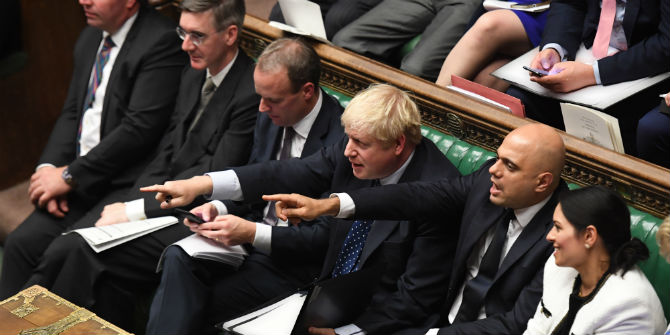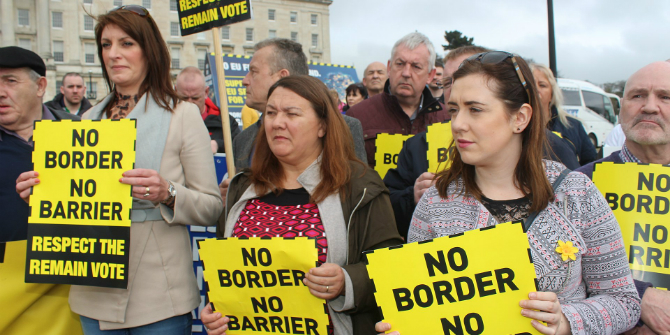 Only if the opposition parties accept that Boris Johnson has now defined Brexit can it unite to defeat his deal, writes Phil Syrpis (University of Bristol). Trying to redefine the terms of the deal will exasperate the public and probably end in failure. The path to remain lies in a second referendum or general election.
Only if the opposition parties accept that Boris Johnson has now defined Brexit can it unite to defeat his deal, writes Phil Syrpis (University of Bristol). Trying to redefine the terms of the deal will exasperate the public and probably end in failure. The path to remain lies in a second referendum or general election.
Super Saturday turned out to be a damp squib. Because the Letwin amendment was carried (by 322 votes to 306), the House of Commons did not vote either to approve or to reject PM Johnson’s new Brexit deal. Since the vote on Saturday, Johnson has, as he was required to do by the Benn Act, written a letter to the EU asking for an extension to the Article 50 period. He also made it clear to the European heads of state and government that, as far as he is concerned, there is no reason to grant the extension and every reason to expect that the UK will approve the new Withdrawal Agreement and be ready to leave the EU on 31 October.

The events of the last few days pose serious questions for all the actors involved. The EU leaders have to decide how to respond to the extension request. The government has to decide how to take its Brexit plans forward; the passage of the Letwin amendment indicates that there cannot be a meaningful vote on the deal until the Withdrawal Agreement Bill (the ‘WAB’) has been published, debated and agreed. This post concentrates on the questions facing the Opposition, and in particular on whether they should accept that Johnson has succeeded not in delivering, but in defining Brexit.
The various opposition groups, when they passed the Benn Act, were able to unite so as to oppose a no-deal Brexit. They were also able to unite on Saturday: to insist on having the opportunity better to scrutinise both the new Agreement with the EU, and the WAB – the piece of UK legislation needed to give domestic legal effect to the Withdrawal Agreement, expected to contain a number of controversial provisions, relating for example to the relationship between UK and EU law during and after the transition period.
But – and this refrain is all too familiar, they have not been able to unite to agree an alternative to the Prime Minister’s new Brexit plan. The range of ‘Brexit solutions’ favoured by the Opposition is broad. The range of processes through which a Brexit solution may be reached – a general election, a government of national unity, a people’s vote – is also broad. To state the obvious, if they are going to stop Johnson’s plans, they are going to have to find a way to unite again.
The key development is that we now know that there is a concrete version of Brexit which the government and the Conservative party, from Ken Clarke, via Theresa May, to Mark Francois, is prepared to endorse. There are already many excellent analyses of the deal itself (see in particular this from Steve Peers). In brief, the deal envisages (for GB) a far harder form of Brexit than May’s Brexit deal, and bears no relation to the sort of Brexit the Labour party has indicated it would endorse. On the Irish border question, there is, of course, a fundamental choice (illustrated by Daniel Kelemen here). Brexit will end with the UK in the customs union and single market (at least for goods); or with a hard border across Ireland, or across the Irish Sea. May’s deal contained enough on customs and regulatory alignment to render both borders ‘de-dramatised’. Johnson’s deal opts for the Irish Sea border solution. It represents a hard Brexit for Britain, with special status for Northern Ireland. If the deal passes it is likely to cause significant damage to the UK, economically and politically (see, for example, this analysis). Its passage is also likely to herald a general election, in which Johnson will, no doubt, reap the benefit associated with delivering (whether or not by 31 October) on his promise to deliver Brexit.
Has Brexit now been defined?
It seems to me that the most important strategic question facing the Opposition is whether to accept (as the Conservative party has) that Brexit has been defined; or whether to continue to make the case for other, less economically and politically damaging, versions of Brexit. The decision to accept Johnson’s definition is likely to be especially difficult for those who harbour ambitions of a better Brexit. It leaves them facing a stark choice – Johnson’s Brexit or remain – both of which are, for them, distinctly sub-optimal outcomes. Nevertheless, it seems to me that there are two strong reasons why the Opposition should now accept that Johnson has succeeded in defining Brexit.
First, the public has (probably long ago) lost patience with the ongoing Brexit debate. There are strong demands to get it done, and, conversely, to get it gone. Johnson’s plea to ‘get Brexit over the line’ of course obscures the reality that his deal would usher in long and tortuous negotiations over the UK’s future relationship with the EU, but, and this is the point here, there is no doubt that the urgency of his message appeals to voters. An opposition seeking more time to negotiate a different version of Brexit (albeit one which would do more to ensure that the UK is aligned with the EU) is unlikely to find favour with an increasingly exasperated electorate.
Second, and perhaps more importantly, if the Opposition is to embark on the task of seeking to redefine Brexit, they are likely to disagree. Some will perhaps be prepared to endorse the deal, once it has been scrutinised properly, and once the terms of the WAB have been published, debated and agreed. Others will want a softer Brexit deal, either with a UK-wide backstop (as per Theresa May’s withdrawal agreement), or with a commitment to membership of the Customs Union or the Single Market, either in the political declaration or the WAB. Conversely, if they accept Johnson’s definition, they are likely to be able to unite in opposing (this concrete) Brexit. Moreover, once it is accepted that Johnson’s deal is Brexit, a path forward opens, enabling MPs to offer the people a democratic choice, whether via a general election or a people’s vote, between Johnson’s Brexit and remain.
The choreography of the next days will in large part be determined by the actions of the EU and the government. The arithmetic in the Commons gives the Opposition significant power, but only if they are able to act in a united way. Acceptance that Johnson’s deal represents Brexit – and that Brexit is therefore something which the Opposition can unite in opposing – may be what they need to do in order to be able to find a path to remain.
This post represents the views of the author and not those of the Brexit blog, nor LSE.







Boris Johnson has at least agreed a deal with the EU27 which is acceptable to almost the whole of the Conservative Party (including the ERG) as well as a number of Labour Leavers. I know Nigel Farage and the DUP don’t like it; I think Farage is just arguing for votes and the DUP is hunting unicorns. So the new Withdrawal Agreement can be legitimately be represented as implementing, so far as is possible, what was voted for in 2016. It’s now up to MPs to decide if they want to honour the 2016 referendum or not.
A second referendum would be a disaster. It would almost certainly be crammed into the minimum possible time, meaning that the result should carry much less authority than the result of the first one (which was, of course, also supposed to be a Final Say referendum). Those who think a second referendum would finally settle Brexit probably also believe an alcoholic when he says he needs just one more drink before stopping for ever.
The Labour Party’s main objection to the new withdrawal agreement seems to be that it puts Westminster in control of things like employment law and environmental regulation, and they would prefer these things to be run from Brussels, or do I misunderstand something? Has the Labour Party given up on implementing its policies by convincing the British people to vote for them?
The Liberal Democrats have a reasonable proposal, namely revoking Article 50 without a referendum. It isn’t unreasonable for MPs to say “Sorry, dear voters, but on this case we really do know better”, though of course they have to justify that at the next General Election. I don’t actually agree with the Liberal Democrats, because I think the 2016 referendum has to be honoured, but at least they are reasonable, unlike all the other remain parties.
I wish the MPs now just had two options, namely new Withdrawal Agreement vs Revoke. I would love to see a straight vote between the two, since all the other options are unicorn-hunting, fudge or BRINO. But I fear I won’t. MPs are just too interested in political point-scoring and avoiding alienating the Leavers or Remainers in their constituencies. And so the indecision goes on.
“Withdrawal agreement vs Revoke”
As a leaver this would be unacceptable to me. If we are to remain then we must be full EU members including the Euro and Schengen. It would unacceptable to remain in the EU in a subordinate role.
Leave or Remain has already been decided. The next referendum, if any about Brexit, can only be on No deal or a deal agreed by Parliament before the two years is up. Since the two year term since Article 50 has long passed, No deal it is by default. Parliament has spent too long dithering. Its time is up.
It is becoming increasingly clear that a) Johnsons deal will be extremely damaging to the UK economy, and b) will contribute enormously to Irish re-unification and Scottish independence. I regret the damage, but I welcome the other two consequences. No doubt the rump UK (or whatever it will be known as by then) will attempt to rejoin when the results of this gargantuan folly become clearer to its population. By then however it will take a great effort to regain the equivalent economic position of three years ago. Madness has consequences.
@Jams: “Johnsons deal will be extremely damaging to the UK economy” Can I have your macroeconomic crystal ball please? The only thing I know about macroeconomics is that nobody seems to be able to forecast anything. I suppose it is quite likely that Johnson’s deal, and Brexit generally, will be damaging to the UK economy (I would probably have voted Remain if I’d had the chance, for that reason), but I don’t think anyone can honestly say that they know that.
Well, it sort of stands to reason. If you give up a pretty large and comprehensive trading deal with your nearest neighbours, then from a position of desperation (and it will be desperation) try to replace that by deals with a number of more remote countries who are not necessarily friendly, or if they are, will not let that get in the way of getting the most advantageous terms for themselves, then what are the chances that it will be mostly damaging?.
@Jams, yes, but you don’t know for sure, do you? The only way the UK can find out what life outside the EU would be like is by trying it.
I’m not going to argue with you about probabilities. As I said, I also think it quite likely Brexit will damage the economy.
“An opposition seeking more time to negotiate a different version of Brexit (albeit one which would do more to ensure that the UK is aligned with the EU) is unlikely to find favour with an increasingly exasperated electorate.”
Nor will an opposition seeking the necessary time to conduct a referendum. In any case, the new EU agreement is one that will be acceptable to those who have no preference between remain and leave but just wish to get it over with. The bottom line is that voters will no longer consider the Brexit Party as a viable option in a forthcoming election, whereas the Remain vote will be split. In the final analysis Brexit will not be frustrated and it is therefore best to progress it as soon as possible.
Viktor Orban for prime minister with his hand picked cabinet.
… job done.